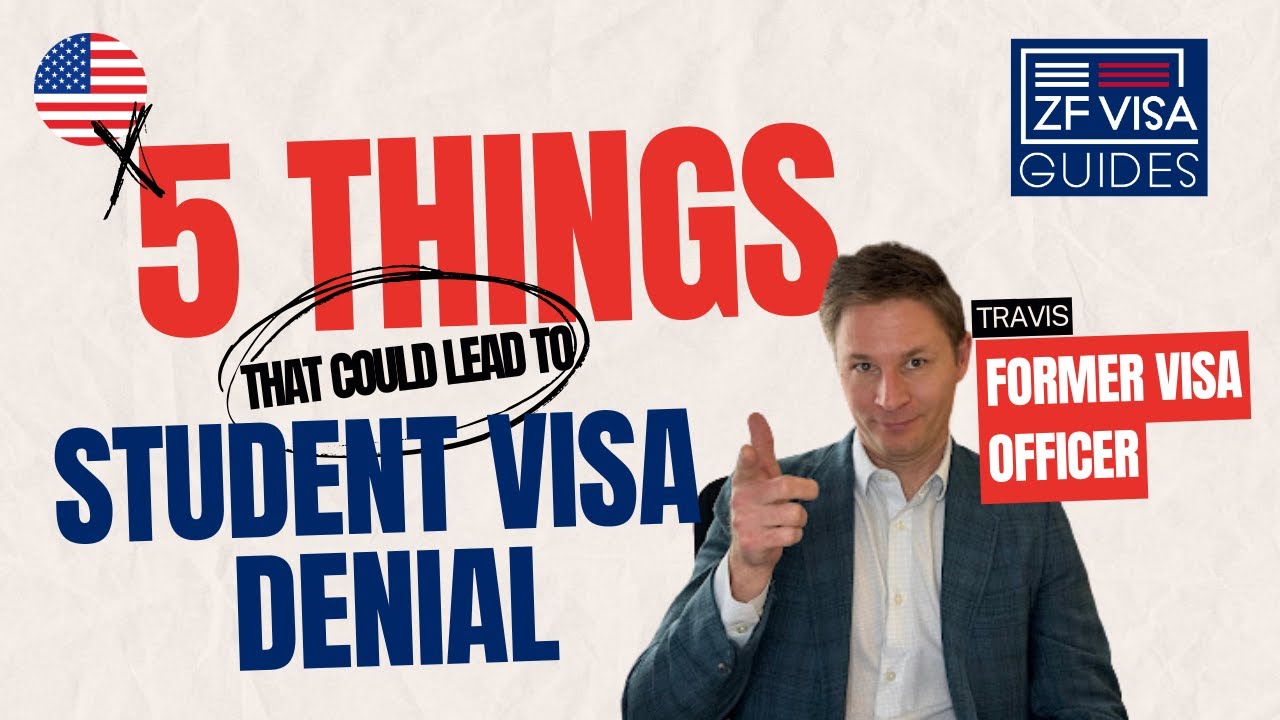What Visa Officers know at the time of the interview (and the 3 things they check for!)
Summary
TLDRIn this video, a former Visa officer reveals what information Visa officers review before an interview and the top three factors they consider when deciding on visa approval. Officers typically learn about a case just before the interview, focusing on the applicant's travel duration, visa type, family in the U.S., previous denials, job, and family situation. The three key areas of focus are past visa denials, clearances (criminal history checks), and whether an immigrant visa has been filed on the applicant's behalf. The importance of being well-prepared for the interview to avoid a swift denial is emphasized.
Takeaways
- 🕵️♂️ Visa officers typically have limited prior knowledge of your case and review your DS-160 form just before the interview.
- ⏱️ The decision-making process is often quick, with officers assessing your application in about 30 seconds.
- 🇺🇸 Key information reviewed includes the purpose and duration of the visit, type of visa, family in the U.S., previous denials, employment, and family status.
- 🔍 Officers are adept at quickly scanning and identifying critical factors that impact visa approval.
- 🚫 A previous visa denial is a significant factor, and any changes in circumstances since then are crucial.
- 📋 Being well-prepared for the interview is essential to avoid a quick denial, which can happen within 30 seconds.
- 🔎 'Clearances' involve checking databases for criminal history and other factors that might affect visa eligibility.
- 🌐 The presence of an immigrant visa petition filed on your behalf can complicate non-immigrant visa applications.
- 💼 Demonstrating non-immigrant intent is vital for temporary visa applications, despite any pending immigrant petitions.
- 🗣️ Effective communication and engagement with the visa officer are critical to the outcome of the interview.
Q & A
How much information do visa officers typically know about an applicant's case before the interview?
-Visa officers generally don't know much about an applicant's case until right before the visa interview, typically reviewing the applicant's DS-160 visa application in the 30 seconds before the interview.
What are the key factors visa officers consider when reviewing a DS-160 application?
-The key factors include the length of the intended stay in the U.S., the type of visa being applied for, whether the applicant has family in the U.S., previous visa denials, the applicant's job and monthly income, and family situation.
Why is it important for visa officers to review an applicant's previous visa denials?
-Previous visa denials are important because they provide context on the applicant's situation and whether it has changed since the last interview, which can influence the current visa decision.
How does the number of previous visa denials affect an applicant's current visa application?
-Multiple visa denials can complicate an application, as all notes from previous denials are in the system and can be reviewed by the visa officer to determine if the applicant now qualifies.
What is the significance of 'clearances' in the visa application process?
-Clearances refer to checks against various databases for criminal history and other factors. If any issues arise, the visa officer may ask the applicant about them to determine eligibility.
How does an immigrant visa filed on behalf of an applicant impact their non-immigrant visa application?
-If an immigrant visa has been filed for an applicant, it can raise concerns about their immigrant intent, which could complicate a non-immigrant visa application that requires the applicant to not intend to stay permanently in the U.S.
Why is it crucial for applicants to be well-prepared for their visa interviews?
-Being well-prepared is crucial because unprepared applicants risk a quick denial, which becomes a part of their visa history and can negatively impact future applications.
What role does the visa officer's experience play in the visa approval process?
-Experienced visa officers can quickly scan information and identify important factors due to the repetitive nature of their work, which can influence their decision-making process.
How many interviews does a visa officer typically conduct in a day, and how does this affect their review process?
-A visa officer might interview between 100 and 150 people a day, which means they develop the ability to review applications and make decisions efficiently.
What advice does the former visa officer give to applicants to improve their chances of visa approval?
-The former visa officer advises applicants to be extra prepared, know what questions might come up, and understand how to answer them effectively to communicate their situation clearly to the visa officer.
Why did the former visa officer start an immigration law firm and visa consultancy?
-The former visa officer started the firm to help applicants avoid the pitfalls of unpreparedness that can lead to visa denials, which can have lasting impacts on their visa history.
Outlines

このセクションは有料ユーザー限定です。 アクセスするには、アップグレードをお願いします。
今すぐアップグレードMindmap

このセクションは有料ユーザー限定です。 アクセスするには、アップグレードをお願いします。
今すぐアップグレードKeywords

このセクションは有料ユーザー限定です。 アクセスするには、アップグレードをお願いします。
今すぐアップグレードHighlights

このセクションは有料ユーザー限定です。 アクセスするには、アップグレードをお願いします。
今すぐアップグレードTranscripts

このセクションは有料ユーザー限定です。 アクセスするには、アップグレードをお願いします。
今すぐアップグレード関連動画をさらに表示

5 Things Visa Officers Consider Before They Start Your Visa Interview

DS-160 Secrets from a Former Visa Officer

How will your country impact your visa interview? Former Visa Officer shares the truth

Proving STRONG Home ties for VISA approval

5 Things that Could Lead to a Student Visa (F-1) Denial according to a Former Visa Officer

How to Pass Your B1/B2 Visa Interview
5.0 / 5 (0 votes)
